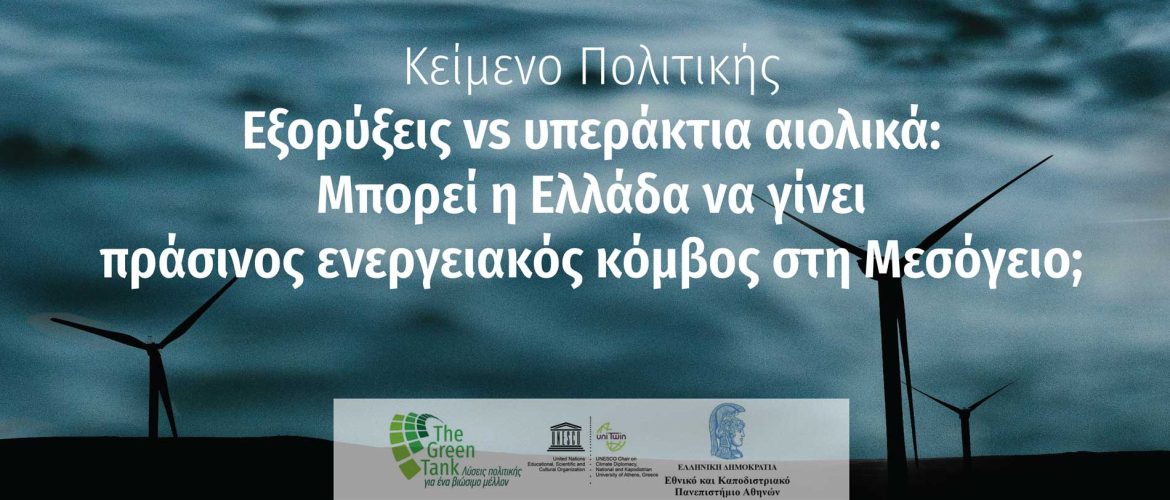JOINT PRESS RELEASE
In the current context of multiple and interconnected crises generated by intensifying climate change and general geopolitical instability, the energy system of the European Union and Greece is faced with historic challenges, with fossil fuels phase out becoming imperative.
Therefore, one of the critical questions that arise is whether reviving plans for hydrocarbon exploration in the Greek seas is a viable option and whether there are alternatives. This is the question addressed in the policy paper “Hydrocarbon extraction vs Offshore wind: Can Greece become a green energy hub in the Mediterranean?”, which was prepared by a research team led by Professor Emmanuella Doussis, National and Kapodistrian University of Athens, UNESCO Chairholder on Climate Diplomacy, through a collaboration with the environmental think tank The Green Tank.
In particular, the policy paper aims first, to comprehend the challenges posed by the current situation and the deadlock in which the exploration and exploitation of hydrocarbons lead. It then examines the possibilities for offshore wind installation offered by the Greek seas and the climate and geostrategic advantages that emerge compared to the extraction program. Finally it highlights the necessary policy adjustments.
The policy paper was presented in an online discussion that was co-organized by the Green Tank, the UNESCO Chair on Climate Diplomacy at the National and Kapodistrian University of Athens, and ELIAMEP. During the discussion, various aspects of the issue such as climate and energy developments in Europe and Greece, the current geopolitical situation, the economic dimension and the potential offered by the progress of offshore wind technology were addressed.
In her introductory remarks, Ioli Christopoulou, Policy Director of Green Tank, mapped the challenges that the energy crisis poses for Greece and the potential of the green way out. “A few months after the REPowerEU and the European Union’s commitments for even greater reductions in fossil gas consumption by 2030, as well as historic records of deployment of renewables and reduction of gas consumption in Greece, the search for domestic gas deposits is incompatible with national and European climate goals, while its economic viability is highly questionable. Offshore wind development with full respect of biodiversity conservation is an option that will accelerate the green transition but also contribute to the normalization of geopolitical differences in a spirit of peace and cooperation”.
Emmanuela Doussis, Professor of International Institutions at the National and Kapodistrian University of Athens and UNESCO chairholder on Climate Diplomacy presented the rationale and the key points of the policy paper. She pointed out that the hydrocarbon extraction program has now been overtaken by international and European developments. “It is a program that was launched in a now, outdated period; a program that is neither in line with the new climate goals nor with the urgent need to accelerate the transition to clean energy and decarbonization. Our research shows that instead of hydrocarbon extraction, both energy autonomy as well as the improvement of the country’s geopolitical role can be achieved through the installation of offshore wind. Wind energy is an inexhaustible and proven energy resource – not just a speculative one – and for this reason it can mitigate rivalry and competition for exclusive control of energy resources as opposed to hydrocarbon extraction”.
Ioannis Ν. Grigoriadis, Associate Professor and Jean Monnet Chair of European Studies at the Department of Political Science and Public Administration at Bilkent University, Turkey and Senior Research Fellow and Head of the Turkey Program at the Hellenic Foundation of European and Foreign Policy (ELIAMEP), outlined the potential for offshore wind in the current and future international political context. “The disruption caused by Russia’s invasion of Ukraine in the European energy market, and in particular the gas market, cannot lead to the disorientation of the European strategy for the substitution of hydrocarbons by renewable energy sources, as made crystal clear in the European Green Deal. The rapid establishment of offshore wind can make Greece a leader in renewable energy in the Eastern Mediterranean, contribute to the interconnection of the electricity grids of the coastal states and provide a powerful tool for regional cooperation”.
Eftichios Sartzetakis, Professor of Environmental Economics at the University of Macedonia, presented insights on the economic and environmental costs and benefits of potential extraction. “Our country needs to take a clear position on its contribution to the transition to zero-carbon activities. This decision should take into account the costs to our country’s environment as well as other activities, such as tourism, but also make clear the expected benefits of potential hydrocarbon exploration. Estimates should also be given on the allocation of any expected benefits to central government, local communities, and also on the impact on jobs. Finally, the above costs and benefits should be compared with the alternative investment in renewable energy sources in which our country has obvious comparative advantages. Unfortunately, the debate on hydrocarbon exploration in our country does not provide the necessary information”.
Panagiotis Papastamatiou, CEO of the Hellenic Wind Energy Association (ELETAEN/HWEA) commented on the opportunities and challenges of offshore wind today and into the future. “It is very important that the institutional framework for offshore wind that was adopted in the summer is quickly put on track for completion and implementation. Systematic and coordinated work by the relevant stakeholders involved is important to identify and establish in principle suitable broader areas and to grant the first permits to interested investors. In this way we can take an important step immediately to make our wind potential – and in particular that of the Aegean – a pillar of energy independence for Europe”.
The online discussion took place on November, 30 2022 with the participation of decision-makers, representatives of academic institutions and stakeholders.
The full text of the policy paper is available here, and its synopsis is available here.
The video of the event is now available on The Green Tank’s YouTube channel (in Greek). You can watch it here:



















































































































































































































































































































